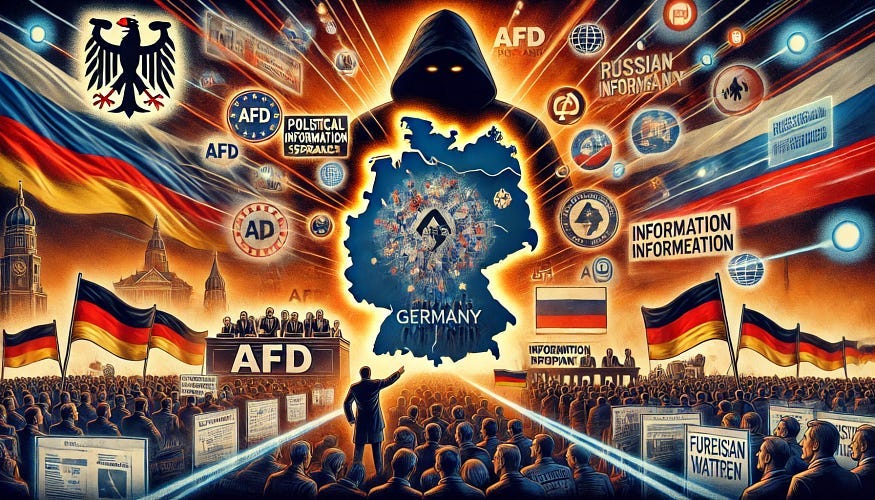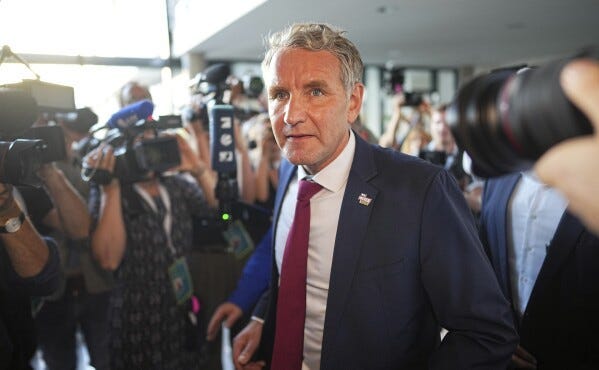How Putin’s Influence is Shaping European Politics: The Case of Germany’s Far-Right Surge
As Germany’s far-right AfD party gains momentum, evidence suggests Russian influence is fueling the shift, challenging European democracy and highlighting the stakes in the ongoing information war.

In recent years, Europe has witnessed a surge in far-right political movements that challenge the very foundations of democratic governance. The recent electoral success of the far-right Alternative for Germany (AfD) party in two eastern German states is a clear manifestation of this trend. While the factors driving these political shifts are numerous and complex, there is growing evidence to suggest that Russian President Vladimir Putin and his government have had a hand in shaping this outcome. As part of a broader strategy in the ongoing information war, this influence has significant implications for the future of democracy, not just in Germany, but across Europe.
Putin’s Hand in the Rise of the AfD: The Evidence
The AfD’s recent victories in Thuringia and Saxony, where it outperformed the traditional center-right Christian Democratic Union (CDU), highlight a critical moment for Germany’s political landscape. While internal discontent, economic concerns, and a backlash against Chancellor Olaf Scholz’s government played a role, there is a deeper geopolitical context. Over the past decade, Russia has been actively involved in using its resources to support far-right movements across Europe, including the AfD. This strategy aligns with Putin’s broader goal of destabilizing Western democracies and weakening their collective response to his policies, especially regarding Ukraine.
Disinformation Campaigns: Russia has perfected the art of disinformation through state-sponsored media outlets like RT and Sputnik, social media bots, and online trolls. These entities have systematically spread narratives that support far-right ideologies, amplify fears about immigration, and portray European governments as ineffective or corrupt. In Germany, such campaigns have often targeted key issues that resonate with AfD voters, such as skepticism about immigration and opposition to German support for Ukraine.
Financial and Political Support: Although direct financial links between the Kremlin and AfD are difficult to prove, there have been numerous reports of Russian efforts to cultivate relationships with far-right politicians in Europe. Leaked documents and intelligence reports suggest that the Kremlin has explored various means of funding and influencing European populist movements, including the AfD. These efforts are part of a broader strategy to undermine European unity and NATO cohesion.
Exploiting Social and Economic Divisions: Russia’s influence operations have targeted social and economic divisions within Germany. In the former East Germany, where economic disparities remain stark and political alienation is palpable, the Kremlin has found fertile ground for its messaging. By amplifying local grievances — whether related to economic inequality, immigration, or perceived government overreach — Russia has managed to sow discord and bolster support for populist parties like the AfD.
The Information War: Putin’s Strategy to Weaken Democracies
The information war, a concept that encompasses the use of propaganda, disinformation, cyberattacks, and other forms of digital manipulation, has become a cornerstone of Putin’s foreign policy. Through the Kremlin’s information warfare, Russia seeks to achieve several strategic objectives:
Undermine Democratic Institutions: By supporting populist movements that challenge democratic norms, Russia aims to weaken the internal cohesion of democratic states. The rise of the AfD, which openly questions the legitimacy of Germany’s democratic institutions and promotes radical changes to the political system, aligns with this objective. As a party under surveillance by German intelligence for its ties to right-wing extremism, the AfD’s success is a direct threat to the stability of Germany’s democratic order.
Fracture European Unity: Germany, as the EU’s largest economy and a key player in the Western alliance, is a prime target for Russian efforts to sow discord. By fueling far-right movements that oppose EU policies, NATO expansion, and support for Ukraine, Putin aims to fracture European unity. The AfD’s strong opposition to military aid for Ukraine and its skepticism about Germany’s role in the EU align with Moscow’s geopolitical interests, weakening the EU’s collective stance against Russian aggression.
Shift Public Opinion: Russian disinformation campaigns seek to shape public opinion by spreading false narratives that discredit mainstream political parties and promote populist alternatives. In Germany, these narratives have focused on issues like immigration, economic hardship, and dissatisfaction with the political establishment — key themes in the AfD’s rhetoric. By shifting public opinion towards far-right ideologies, Russia hopes to create a political environment more favorable to its strategic interests.

Implications for Democracy in Germany and Beyond
The recent success of the AfD is not just a challenge to Germany’s political status quo; it is a signal of a broader shift in European politics. The rise of far-right movements, bolstered by external actors like Russia, poses several risks to democracy:
Erosion of Democratic Norms: Far-right parties often challenge fundamental democratic principles, such as the rule of law, freedom of the press, and the protection of minority rights. As these parties gain more influence, there is a risk that democratic norms will erode, leading to a more polarized and unstable political environment.
Destabilization of Governing Coalitions: With mainstream parties refusing to form coalitions with the AfD, the ability to form stable governments becomes increasingly challenging. This situation can lead to political paralysis, reducing the effectiveness of democratic institutions and eroding public trust in the democratic process.
Increased Vulnerability to Foreign Influence: As populist parties gain strength, they may be more susceptible to foreign influence, especially from actors like Russia that share their anti-EU and anti-NATO sentiments. This susceptibility could lead to policy decisions that align more closely with Russian interests, further weakening the European alliance.
Conclusion: Defending Democracy Against Information Warfare
The rise of the AfD in Germany is not an isolated event but part of a broader pattern of far-right resurgence across Europe, with Russia playing a critical role in shaping this trend. In the context of the information war, Putin’s strategy is clear: to undermine democratic institutions, weaken European unity, and create a political environment more favorable to Russian interests.
For democracies to defend themselves, they must recognize the nature of this threat and respond accordingly. This response requires a multifaceted approach: strengthening democratic institutions, improving public resilience to disinformation, and fostering international cooperation to counter foreign influence. The future of democracy in Germany — and indeed, across Europe — depends on the ability to withstand this new form of geopolitical warfare and to protect the values that underpin democratic governance.

